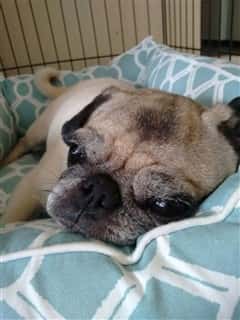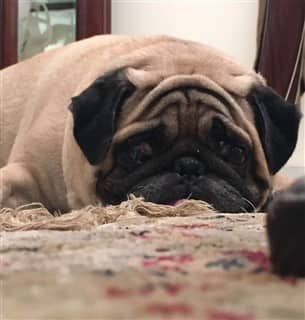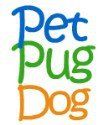Supplements

Pug Dog Supplements
Since this section is quite extensive, you may wish to read through, or
jump to:
Overview
– A brief introduction to what this page covers.
Do Pugs Need Supplements? – If you’re not even sure if your Pug should be given anything, start here.
Daily Vitamins and Minerals
– Dogs needs certain vitamins just like humans do, but different ones than us. This is vital for proper function of the body.
Joint Health Supplements
– This includes glucosamine, chondroitin and optionally CoQ10 and/or MSM.
Omegas
(fish oil) – A very common supplement to give to a Pug puppy or dog. Helps with issues seen often with this breed including conditions relating to allergies, dry skin, itching, poor skin and coat health.
Probiotics
– A supplement that helps with a range of digestive and stomach issues.
High Calorie Nutritional Supplements
– For young pups having a hard time gaining weight, and for senior dogs that are struggling to maintain their weight due to decreased appetite.
Round-up of
Recommended Supplements for Pugs
– All of our recommended supplements that we covered here.
Overview
Canine supplements are a type of ingestible product (pill, chewable tablet, powder, or liquid) that is added to a dog’s diet.
This can include a vitamin, mineral, herbal ingredient, or botanical. It can be just one ingredient, or a blend. And it does not include prescribed medications.
There are quite a few different types of supplements that a Pug can take, and you may be wondering if your puppy or dog could benefit from one of these, or if there is one that could help treat a certain issue that your Pug is experiencing.
Here we will cover:
• Cases in which a Pug would benefit from taking a supplement
• The top 5 most used canine supplements and exactly how they can help
Canine supplements are a type of ingestible product (pill, chewable tablet, powder, or liquid) that is added to a dog’s diet.
This can include a vitamin, mineral, herbal ingredient, or botanical. It can be just one ingredient, or a blend. And it does not include prescribed medications.
There are quite a few different types of supplements that a Pug can take, and you may be wondering if your puppy or dog could benefit from one of these, or if there is one that could help treat a certain issue that your Pug is experiencing.
Here we will cover:
• Cases in which a Pug would benefit from taking a supplement
• The top 5 most used canine supplements and exactly how they can help


Lara (nickname JB), Photo courtesy of Jana Novakova
Lara (nickname JB),
Photo courtesy of Jana Novakova
Does a Pug Need to Take a Supplement?
Not all Pugs need to; if a Pug is eating a top-quality, highly rated dog food and snacks, is healthy in all ways (no illness, no injury past or present, no skin issues, no coat issues, no digestive issues, good appetite, etc.) and is under the age of 7, then supplements are not needed.
However, if a Pug does have certain issues, or for specific situations, the right supplement can make a dramatic difference.
If any of the following applies to your Pug, you may indeed want to read further about supplements:
(continued below)

Jacqui Bo Shae, 13 months , photo courtesy of Christine C.
Jacqui Bo Shae, at 13 months old,
photo courtesy of Christine Chinn
• Eating homemade food
- This is a super-healthy choice and a great way to avoid the pitfalls with many dog food kibbles; but, you’ll need to add a daily vitamin & mineral.
• Eating an inferior dog food
– Technically speaking, a Pug that is eating a low-quality food would of course benefit from supplements; however, instead of doing this, a switch to a better dog food is recommended, and we’ll dive into the details of this ahead.
• Digestive issues
– This includes gas, diarrhea, runny stools, and/or general stomach upset.
• Recovering from a gastrointestinal issue
– Includes a bad bout of diarrhea or other illness that disrupted the Pug’s stomach and/or digestive system.
• Skin and/or coat issues
– This includes itching, rashes, excessive dry skin, poor coat quality, and/or thinning coat. Many Pugs with these issues are suffering from allergies; though these problems can be due to other conditions as well.
• Age 7 and up
– As Pugs are nearing their senior years, it’s wise to be proactive in regard to joint health.
• Osteoarthritis
- The majority of dogs age 10 and up have some level of this, which causes discomfort and affects mobility.
• Previous injury or condition affecting the bones or joints
– This include hip dysplasia, luxating patella, back issues, broken or sprained bones, and other conditions.
• Trouble gaining or maintain weight
– This often applies to either young Pug puppies or older Pug seniors, but may be affecting a Pug of any age.
Daily Vitamin and Mineral Supplements for Pugs
This is for:
Pugs that are fed home cooked meals.
Take note of this if:
You do not have 100% confidence in the commercial food you give to your Pug.
Overview:
Certain vitamins and minerals are vital for a dog’s body to function properly. They literally keep the body running, and affect everything from brain function to the immune system, from cellular function to metabolism, and more.
What is in these:
There are no ‘extras’ here, every single one of these vitamins and minerals is crucial for a dog:
• Calcium – For strong bones and teeth, helps blood clot, helps nerves send messages, and helps muscles properly contract.
• Copper – Helps the body make red blood cells, helps keep the immune system strong.
• Folic acid – Helps the body produce and maintain new cells. Plays a role in preventing some cancers.
• Iodine – Is needed for the body to produce thyroid hormones which regulate a dog’s metabolism.
• Iron – Transports oxygen throughout the body.
• Phosphorus – For strong bones and teeth.
• Potassium – Needed for proper function of all cells, plays a significant role in digestion, heart, and muscle health.
• Magnesium – Regulates muscle and nerve function, helps control blood sugar levels and blood pressure.
• Niacin – Converts food into fuel.
• Vitamin A – Important for vision, immune system, and organ function.
• Vitamin B1 (thiamine), Vitamin B2 (riboflavin), Vitamin B5 (pantothenic acid) – Each of these 3 vitamins are needed to help the body convert fuel into food.
• Vitamin B6 (pyridoxine) - Is needed for normal brain development and function, including release of chemicals that control mood and regulate the natural ‘body clock’ for sleep.
• Vitamin B12 - Essential for cellular health.
• Vitamin C (ascorbic acid) – Keeps connective tissue, bones, blood, and skin healthy.
• Vitamin D3 – Helps the body absorb calcium (see above).
• Vitamin E – Is an antioxidant (protects a cell from damage).
• Zinc - Keeps the immune system strong, helps wounds heal, helps the body maintain proper sense of taste and sense of smell.
Which Pugs should have a vitamin and mineral supplement:
Home cooked diet
– Making home cooked food
for your Pug can be a great option to offer wholesome food without any fillers or additives often thrown into less-than-ideal kibbles. However, really good brands have healthy food ingredients that are high in vitamins and minerals, and certain vitamins are blended into the mix.
If you cook at home for your dog, it is near impossible to meet requirements without adding in these vitamins, and you’ll want to offer a daily supplement to round things out.
Less-than-ideal dog food
– Of course, you wouldn’t want to be feeding your Pug a substandard food, but you may be doing this inadvertently, or may not realize what certain brands do.
Here’s 3 things to keep in mind:
1)
Inferior dog foods must meet certain regulations, and they often do this by adding in synthetic vitamins. But, for optimal health, you’ll want your Pug to be receiving a large portion of his vitamins and minerals from foods, not additives.

Sunny, at 6 months old, photo courtesy of Ngaara S. Rao
Sunny, at 6 months old,
photo courtesy of Ngaara S. Rao
2)
High-quality brands also add in extra health-smart foods that can greatly benefit a Pug. These ingredients include omega fish oils, probiotics, antioxidants, and glucosamine.
3)
Superior food will also keep by-products, generic meat sources, chemical preservatives, and other detrimental ingredients away from your Pug.
Which foods may not be as good as you think?
May well-known brands (the ones you see stacked high in stores or play commercial on TV) are the ones you’ll want to avoid. This includes but is not limited to the following 1 to 3 star brands:
(continued below)

Jasper, at 3 years old,
photo courtesy of Christine Chater
Jasper,
at 3 years old,
photo courtesy of Christine Chater
Back to Basics (grain-free, dry), Beneful, some formulas of Blue Buffalo, Defender, some formulas of Diamond, some formulas of Eukanuba (the breed specific formulas, dry), Evolution, Full Balance, some formulas of Hill's Science Diet, many formulas of Iams, some formulas of Natural Balance, Purina, Rachael Ray Nutrish (dry), and Royal Canin.
What to do:
If you are home cooking for your Pug, choose one of the better canine vitamin and mineral supplements to add to meals. A good choice is Pet MD's Advanced Multivitamins for Dogs . These are made in the USA and are made in FDA, USDA and FSIS (Food Safety and Inspection Service) regulated facilities.
. These are made in the USA and are made in FDA, USDA and FSIS (Food Safety and Inspection Service) regulated facilities.
These are chewables, which can either be crumbled up and mixed into meals, or given as a treat. They are liver flavored, so most Pugs like them.
If you are not 100% confident
that you are feeding your Pug the best food possible, consider making a switch.
Among our choices for the best foods for Pugs includes Wellness CORE Natural Dry Grain-Free for Small Breeds ; which is very hard to beat.
; which is very hard to beat.
And for a chicken alternative, Merrick Lil Plates Grain-Free for Small Breeds
 is a great option. There are 3 different recipes: lamb, salmon, and beef.
is a great option. There are 3 different recipes: lamb, salmon, and beef.
Glucosamine, Chondroitin – For Joint Health
This is for:
Pugs with past or present joint and bone injuries or arthritis, and all senior Pugs.
Take note of this if:
Your Pug is approaching his/her senior years. Most Pug dogs age 7 and up can benefit by taking this before issues start developing.
Overview:
This is often referred to as canine joint health supplements. And while glucosamine and chondroitin should always be included in this, there may also be additional ingredients including MSM and Coenzyme Q10 (CoQ10).
What this is:
Glucosamine and chondroitin are important parts of cartilage. Cartilage is the cushioning between bones.
If the body is not producing enough of these elements, the cartilage wears thin. This causes bones to rub against one another and leads to internal swelling, pain, and decreased mobility.
As a Pug ages, like all canines, the body produces less glucosamine and chondroitin. Once it reaches a certain point, osteoarthritis (often referred to as just arthritis) develops.
Glucosamine and chondroitin can be replaced via supplements. Glucosamine is derived from shellfish and chondroitin is derived from both sharks and cattle cartilage. Though, both can be made in laboratories.
CoQ10, a naturally occurring enzyme in the body, may be added to this supplement due to its anti-inflammatory properties.
MSM is not naturally occurring; this is an organic compound supplement that may help with flexibility and may work to reduced swelling and discomfort.
Pugs that can benefit from joint health supplements:
A Pug of any age that has had hip, knee, elbow, or back issues.
These sorts of conditions lead to a higher chance of developing arthritis, and these issues often bring about decreased mobility. For these reasons, many veterinarians recommend joint health supplements as part of ongoing treatment and for prevention in regard to possible future issues.
Pugs 7 years and older.
With all breeds, 1 in 5 dogs will have arthritis, and it is one of the most common ailments for both middle-aged and senior dogs. For the Pug, with his barrel-shaped body and heavy bone structure, arthritis is develops quite often.
It can really affect a dog’s quality of life. Dogs with arthritis have trouble walking, jumping up, and rising up from a down position. Pain and discomfort can interrupt sleep.
For these reasons, you may want to consider preemptively giving this type of joint health supplement to your Pug before there are clear signs of arthritis.
Pugs already diagnosed with osteoarthritis.
There are several types of medicine that can be given to a dog with osteoarthritis, including pain medicine and anti-inflammatories. In addition, just about all veterinarians will recommend a Glucosamine and chondroitin with CoQ10 and MSM.
(continued below)

Nana Jr.,
photo courtesy of Nana Piccardo Moreno
Choosing the right glucosamine supplement:
For a glucosamine chondroitin supplement without any added extras, Trader Joe's Glucosamine Chondroitin Chewable Tablets for Dogs
 is a good choice. This said, if you are going to give this sort of supplement to your Pug, a more advanced formula with added MSM or CoQ10 is a better option. There are no additives in this, and it is made in the USA.
is a good choice. This said, if you are going to give this sort of supplement to your Pug, a more advanced formula with added MSM or CoQ10 is a better option. There are no additives in this, and it is made in the USA.
Since these are chewables, it is easy to give to Pugs; you can offer it as a treat or mix into a meal.
The dosing with these liver flavored chews is 1/2 of a tablet for each 20 pounds. So, most adult Pugs will be given 1/2 tablet per day, which means that a bottle will last quite a while. This is made in the USA.
For glucosamine and chondroitin with added CoQ10 and/or MSM, there are a couple really good choices.
One is Doggie Dailies Advanced Hip & Joint Supplement for Dogs , which has glucosamine, chondroitin, MSM and
CoQ10. In addition, this has some beneficial extras including omega 3 and 6, vitamin C and E, and Yucca Schidigera, a desert plant used for many things and known for its anti-inflammatory qualities.
, which has glucosamine, chondroitin, MSM and
CoQ10. In addition, this has some beneficial extras including omega 3 and 6, vitamin C and E, and Yucca Schidigera, a desert plant used for many things and known for its anti-inflammatory qualities.
For dogs 15 to 30 pounds, dosing is 2 of these chicken flavored chews per day. This is made in the USA.
Another good one is Infinite's All-Natural Hip & Joint Supplement for Dogs . In addition to glucosamine, chondroitin, and MSM and also has organic turmeric; curcumin, which is found in turmeric, is a natural anti-inflammatory. This is also made in the USA.
. In addition to glucosamine, chondroitin, and MSM and also has organic turmeric; curcumin, which is found in turmeric, is a natural anti-inflammatory. This is also made in the USA.
Dosing is 1 for these beef flavored chews is 1 per day (for dogs 15 to 25+ pounds).
Omega 3 Fish Oils - For Skin (itching, dryness, peeling) and Coat Health (brittle fur, thinning fur)
This is for:
Pugs with allergies, and Pugs suffering from most types of skin and coat issues including excessive dryness, chronic itching, peeling, dry fur, and/or thinning fur.
Please note:
While this sort of supplement is great for restoring skin and coat health, it cannot kill parasites including mites and fleas, and it cannot treat skin yeast infections. For these and other related issues, you will want to use a specialized shampoo for Pugs.
In addition, while fish oil is a part of allergy treatment, if your Pug is dealing with this issue, there are many other additional steps to take to help a Pug with allergies.

Bruno, at 5 years old, photo courtesy of Sasha
What this is:
Omega 3 and omega 6, also known as omega fatty acids, or simply as fish oil, are essential oils. This means that canines cannot produce these on their own; they must come from food sources.
General omega oils can be found in some foods like walnuts and flaxseed. Omega fish oils, comes from – you guessed it, fish. One of the best ways to supplement omega for canines is via salmon.
What this does:
Most healthy Pugs (no skin or coat issues), that are eating a top-end dog food
(will have omega 3 included) do not need extra supplementation. However, for Pug puppies and dogs that are contending with certain ailments, even the omega levels found in high-quality kibble may not be enough. And this is when supplements can help.
Omega fatty acids play a crucial role in both skin and coat health.
For skin, it keeps it healthy, moisturized, and with proper elasticity; this helps prevent drying, flaking, peeling, cracking, and itching.
Some reasons behind poor skin health include allergies, inferior dog foods, and weather/seasonal related elements such as sun exposure in the summer
and cold arid air in the winter.
With fur, it plays a big role in the health of hair follicles and the texture of the fur. Extra omega can maintain a good coat and can work to restore a damaged one.
Fur can become damaged due to contact friction or may be thinning in relation to ailments including alopecia. Allergies play a role with fur as well, since it affects skin and skin and fur go hand in hand.
Choosing a good omega supplement:
Omega can be found in several different forms including chews, soft-gels, and liquids. One of the best types of omega for Pugs is pure, 100% fish oil in liquid form. This means that it is straight fish oil (preferably salmon) with no added extras.
A big bonus of this type of supplement is that it tastes and smells fantastic to dogs. So, there’ll be zero complaints from your Pug.
One that we highly recommend is Zesty Paws's Pure Wild Alaskan Salmon Oil for Dogs & Cats , which comes in a super-easy to use pump in order to add it to meals.
, which comes in a super-easy to use pump in order to add it to meals.
It is salmon oil, and nothing else, and is made from wild salmon caught off the coast of Alaska. Note that you will see both DHA and EPA listed with this; these are not additives, these are alternative terms for omega 3s.
Most adult Pugs (12.5 to 25 lbs.) should be given 1 pump per day. If you have a Pug on the larger side (over 25 lbs.), you can do 1 and 1/2. Be sure to mix this very well into your dog’s kibble, if not your Pug may pick out just the pieces that have the fish oil on them.
Probiotics – For Stomach and/or Digestive Issues
This is for:
Pugs with stomach issues including gas (burping or flatulence), runny stools, chronic bouts of diarrhea, and general stomach upset.
(continued below)

Toodles, at 4 months old,
photo courtesy of Jim & Shari Donoho
This is for:
Pugs with stomach issues including gas (burping or flatulence), runny stools, chronic bouts of diarrhea, and general stomach upset.
Can be used to help a Pug recover from a bad bout of diarrhea or issues associated with side effects of medications.
Please note:
While probiotics can help get a Pug’s digestive system back on track, it cannot cure serious stomach ailments or stop a Pug from reacting to foods that are causing the issue.
For this reason, if your Pug has frequent or severe diarrhea, call the vet for this, it may be a serious matter that needs immediate intervention and dehydration is always a top concern.
If your Pug always seems to have an upset tummy, reassess what you are feeding your Pug, and have all possible triggering conditions ruled out by the veterinarian.
What these do:
Inside the digestive tract is both ‘good’ and ‘bad’ bacteria. With healthy dogs, there is a balance. But, the ratios of these can be thrown off. And that is when troubles can begin. Probiotic supplements help restore the ‘good’ type of bacteria, which leads to a healthier digestive system.
Choosing the right probiotic for your Pug:
What about yogurt? Most yogurts, while a great source of probiotics, contain lactose. And, since canines are sensitive to lactose, eating yogurt often leads to additional stomach problems. Note that Greek yogurt is not exception; it contains lactose but just a lower amount (2 to 6 grams vs 11). So, even Greek yogurt can upset a Pug’s stomach.
There are 2 things to keep in mind:
1.
To find a good probiotic to help a Pug with stomach issues, you’ll need to pay attention to exactly which type of probiotics are in a supplement. There are quite a few strains, and not all of them will be in any one supplement. So, you’ll want one that have at least 20 strains of this good bacteria.
2.
Look for a supplement that contains inulin, which is a prebiotic. This works to deliver the probiotics to the intestines and makes the supplement much more effective.
One that meets these requirements is Pet Ultimates Probiotics for Dogs . It contains the prebiotic inulin and is formulated with 22 of the top probiotics that dogs need.
. It contains the prebiotic inulin and is formulated with 22 of the top probiotics that dogs need.
This comes in powder form, which makes it very easy to give to a Pug; for all dogs 50 lbs. and under, dosing is 1 scoop per day. This is sprinkled on top of the dog’s food, and then mixed in well.
High-Calorie Nutritional Supplements - For Puppy Weight Gain or Senior Maintenance
This is for: Young Pug puppies that are struggling to eat and grow as expected. And older, senior dogs that due to decreased appetite are having a hard time maintaining their weight.
Please note:
When a puppy is not gaining as expected, there can be many reasons why; most of them require veterinarian care. This may include worms or other ailments that require professional treatment and prescribed medication.
This said, some puppies do struggle with weight, despite otherwise being in perfect health.
With seniors, it is common for there to be some level of decreased appetite due to self-regulation in response to a slower metabolism. However, this can also be due to a wide range of issues including but not limited to canine diabetes, heart problems, kidney issues, and just about any condition that is causing pain.
What these are:
When you need to get your Pug to eat, but your puppy or dog refuses or is in need of more calories than what he can reasonably eat, this is where nutritional supplements can help.

Ellie, at 2 months old, photo courtesy of Darly Moreno
Ellie, at 2 months old,
photo courtesy of Darly Moreno
These are high-calorie gels, so a dog can take in calories without chewing and without his stomach filling up.
Choosing a good nutritional supplement:
One of the most popular and most effective ones is Tomlyn High Calorie Nutritional Gel for Puppies , also known as Nutri-gel. Note that there is also an adult formula as well.
, also known as Nutri-gel. Note that there is also an adult formula as well.
There are 28 calories in each teaspoon. For a Pug puppy that only weighs a few pounds, and that needs 55 calories for each pound of body weight per day, two teaspoon servings (56 calories) offers a great boost.
For older, senior dogs, calorie requirements are about 45 calories for each pound of body weight, per day. So, 2 or 3 teaspoon servings (56 or 84 calories) is also a great boost.
Most dogs find this gel to taste very good, and you can just have your Pug lick it off the spoon.
Round-up of all Recommended Supplements for Pugs
Below are the recommended supplements that we have covered in this section.
If you do not see the images, try a refresh. And on mobile, you may need to turn the screen horizontal to see both sets of 4.
First, these are the daily vitamins and minerals, and the 3 top choices for glucosamine and chondroitian; the advanced has MSM and CoQ10, and the All-Natural by Infinite has tumeric:
And these
next four
include the pure salmon oil, an effective probiotics powder, and the two formulas for Nutrical (puppy and adult dog).
You May Also Like:
Choosing the right bowl for a Pug
- It's important to have the right dishes for both food and water. This can affect everything from a Pug's comfort when eating and drinking to serious issues such as bloat.
Top Pug Dog Care Tips
- The 15 most important things that you should be doing for your Pug.
How to Help a Pug with Separation Anxiety
- It's very common for Pugs to have trouble staying home alone; but, there are lots of things you can do to improve things.
How to Discipline a Pug
- Pugs have quite amusing personalities, but it's not funny if your dog never listens to you. Learn the best way to show him right from wrong, for a well-behaved Pug.
PetPugDog.com Copyright 2019. All rights reserved. Privacy Policy
We are a participant in the Amazon Services LLC Associates Program, an affiliate advertising program designed to provide a means for us to earn fees by linking to Amazon.com and affiliated sites.

